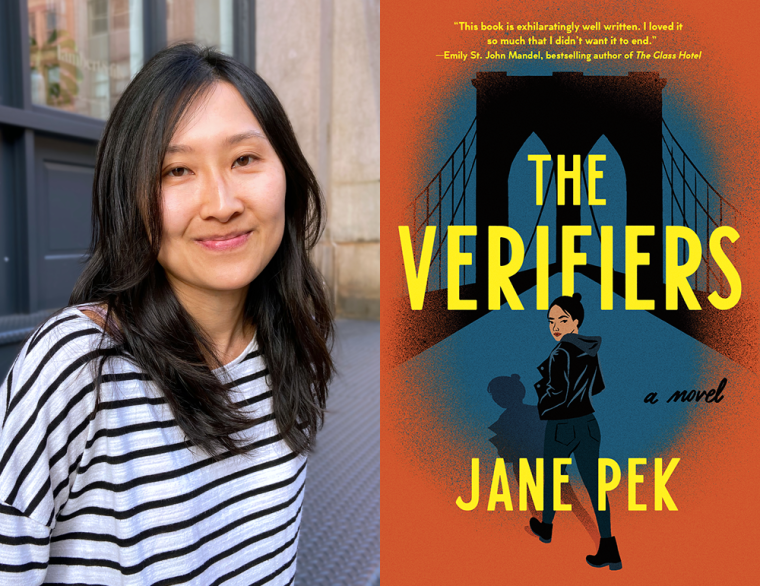This week’s installment of Ten Questions features Jane Pek, whose debut novel, The Verifiers, is out today from Vintage. As an ardent fan of mystery novels, Claudia Lin is almost too invested in her work at Veracity, a company that offers discreet investigative services to people using online-dating platforms. One day a client is reported to be found dead, and while Claudia’s superiors believe this is none of Veracity’s business, she secretly begins to explore the case. Through Claudia’s perceptive and entertaining narration, The Verifiers underscores the pitfalls and absurdities of modern technology. The novel is also an intimate portrait of a young, queer Chinese American person forging her own path. “A clever and thought-provoking mystery laced with wit and insights about technology and relationships, who we are and who we pretend to be,” writes Charles Yu. “Smart, twisty fun.” Jane Pek was born and grew up in Singapore. She holds a BA from Yale, a JD from New York University, and an MFA in fiction from Brooklyn College. Her short fiction has appeared in the Brooklyn Review, Conjunctions, Witness, and twice in Best American Short Stories. She lives in New York City, where she works as a lawyer at a global investment company.

Jane Pek, author of The Verifiers. (Credit: Angela Yuan)
1. How long did it take you to write The Verifiers?
A very long time…. I came up with the original premise for the book seven or eight years ago at this point. I worked on various versions of it during my MFA, got so far as to start submitting to agents—and then realized the book wasn’t ready and spent nine months overhauling it before going out to agents again. From there it took another year of revisions before I sold the book, and then several more months of editing.
2. What is the earliest memory that you associate with the book?
I was living in Singapore for a year in between my job at a law firm in New York City and starting my MFA. While sitting on a bus and staring out the window, the thought came to me: What if there was an agency that verified people’s online-dating personas? I had recently heard a BBC Radio segment about wedding detectives in India who would be hired when a couple got engaged—typically by the parents of one or even both sides—to check up on the prospective bride/groom and their family. I thought it’d be interesting to apply that concept in the online-dating context.
3. What was the most challenging thing about writing the book?
Tying things up. Given that I was playing with tropes of the murder mystery, it felt essential to resolve the question of how the crime was committed, by who, and why—and how my protagonist Claudia Lin figures it out—in a way that was both surprising and satisfying, while keeping within certain parameters I set. That took a lot of head banging against figurative walls.
4. Where, when, and how often do you write?
I write at my desk in my room. I’m not a coffee-shop writer, mainly because I’m constantly eating as I write, so I need a kitchen close by. When my partner sees me in the kitchen, I tell her that I’m still working because I’m thinking about my writing as I prepare my food. I write best in the mornings, but I try to squeeze in a bit of work in the afternoons and evenings as well. And I write every day.
5. What are you reading right now?
I’m always halfway through a number of books. Right now: Visitors by Anita Brookner, which I picked up because I was interested to read something about aging and what it’s like to grow old; Last Tang Standing by Lauren Ho, a hilarious debut rom-com by a fellow Southeast Asian writer; The Life and Death of Sophie Stark by Anna North, which does such an amazing job of pinpointing those moments when a person’s interior world changes; and The Sports Gene by David Epstein, which looks at the science behind extraordinary athletic performance.
6. Which author, in your opinion, deserves wider recognition?
Rosalie Knecht—I loved her coming-of-age spy novel Who Is Vera Kelly? and I’m so excited that it’s now a trilogy.
7. What is one thing that your agent or editor told you during the process of publishing this book that stuck with you?
They have both said many insightful things in the course of this process. To pull one out: As we moved closer to publication, my agent, Julie Barer, told me that I should think about what is important to me, in terms of what happens with this book once it is out in the world. I hold on to that because there are so many books coming out all the time, and so many different indicia of external success and validation, and it can be easy to feel overwhelmed.
8. What is one thing that surprised you during the writing of The Verifiers?
How long it takes to publish a book! My day job is in law, and there everyone always wants everything done ASAP—an acronym I have come to revile. It’s refreshing, if also sometimes frustrating, that writing and publishing a book, from start to finish, is typically a multiyear journey.
9. Who is your most trusted reader of your work and why?
My partner, Angela, because I know that if she doesn’t like something or thinks it doesn’t work, she will tell it to me straight.
10. What’s the best piece of writing advice you’ve ever heard?
Again there are so many. But one that I use as a guidepost in everything I write is that plot should follow character, versus character following plot.







